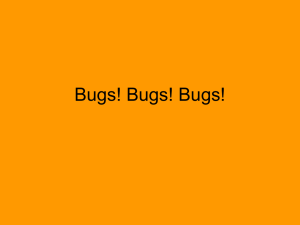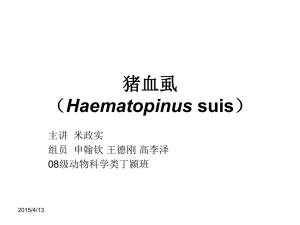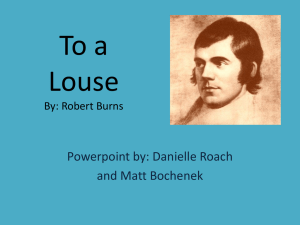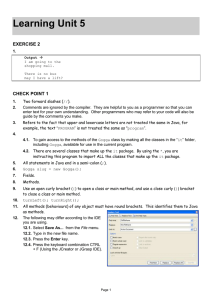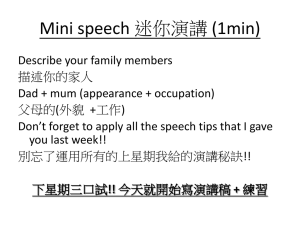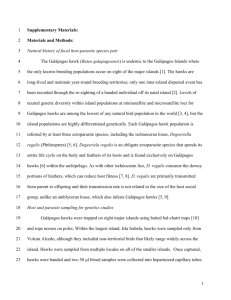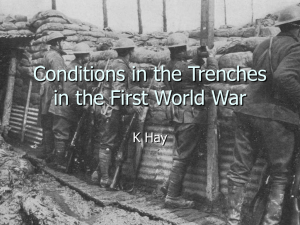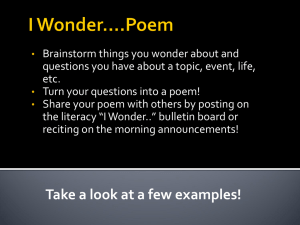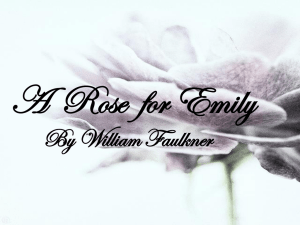File - Mrs. O`s Brit Lit Webpage
advertisement
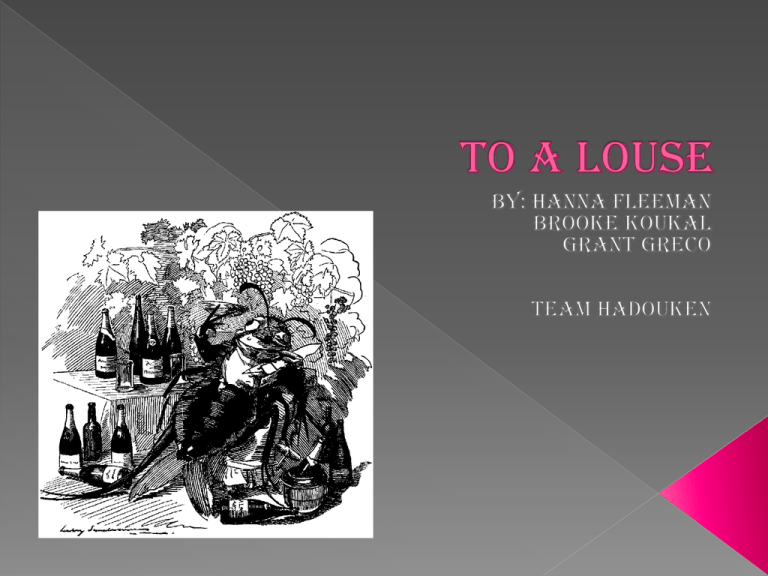
To a Louse Ha! Whare ye gaun, ye crowlin ferlie? Your impudence protects you sairly, I canna say but ye strut rarely Owre gauze and lace, Tho' faith! I fear ye dine but sparely On sic a place. Why, rodent, are you in this woman’s hair? It is not where you usually live, and there is nothing for you to eat there. The lady is of a higher class than most people and her class emphasized personal hygiene. So why would a mouse be in her hair? Ye ugly, creepin, blastit wonner, Detested, shunn'd by saunt an' sinner, How daur ye set your fit upon her -Sae fine a lady! Gae somewhere else and seek your dinner On some poor body. You ugly, weird wonder, shunned by everyone, how dare you be seen on this lady? Leave her and go bother someone else. He’s telling the rodent that he is unwanted and that he should go fadiddle someone else. Swith! in some beggar's hauffet squattle: There you may creep, and s prawl, and spr Wi' ither kindred, jumping cattle, In shoals and nations; Whare horn nor bane ne'er daur unsettle Your thick plantations. Get off! You should only live in some beggar’s squat. There you can crawl and creep with the other vermin. No one would bother you there. You should stay within your class. Now haud you there! ye're out o' sight, Below the fatt'rils, snug an' tight; Na, faith ye yet! ye'll no be right, Till ye've got on it --The vera tapmost, tow'ring height O' miss's bonnet. Now stay there where you are hidden, comfortable and warm; But wait there’s still hope, but not until you’ve reached the top. If you are unhappy about where you are then climb up the social ladder. My sooth! right bauld ye set your nose ou As plump an' grey as onie grozet: O for some rank, mercurial rozet, Or fell, red smeddum, I'd gie ye sic a hearty dose o't, Wad dress your droddum! My god! You are so bold to get plump and grey from her! I would kill you if I could! He is talking about moochers who take from the rich to benefit themselves and climb the social ladder. I wad na been surpris'd to spy You on an auld wife's flainen toy: Or aiblins some bit duddie boy, On's wyliecoat; But Miss's fine Lunardi! fye! How daur ye do't. I wouldn’t have been surprised to see you on an old woman’s cap, or on a small ragged boy. But being on this fine woman! How dare you! He’s saying that it’s rare for a louse to appear on someone who is of a high class. He would expect it to be found on a poor child or an elderly women’s hat. O Jenny, dinna toss your head, An' set your beauties a' abread! You little ken what cursed speed The blastie's makin! Thae winks an' fingerends, I dread, Are notice takin'! Oh Jenny, don’t lose your head and squander your beauties. You don’t know how fast that thing will kill you, and you take no notice. He’s saying that she shouldn’t spend time with him because he is low class O wad some Power the giftie gie us To see oursels as ithers see us! It wad frae monie a blunder free us, An' foolish notion: What airs in dress an' gait wad lea'e us, An' ev'n devotion! If only the power of god had given us the power to see ourselves as others see us, it would save us from many mistakes. We would change the way we dress, the way we walk, and even what we worship If we really knew how we looked, then we wouldn’t act certain ways. We would probably have more respect for our peers outside of the classes, or the classes wouldn’t exist at all. Uses slang from the time period it was written. Connotation: Ex- “you crawling wonder?” the hidden meaning behind this is that he is calling it a wonder when, ironically the louse is a pest. Etymology: the Louse because in today’s term we use the word lice. Tone: › The tone of this poem is portrayed as humorous. He starts out talking about the woman being a lady of class as if he was on her side, but then switches it up by chastising her about thinking she’s so beautiful and great. He goes from disapproval to almost encouragement to the Louse. Mood: › The mood that the audience feels is that he is being sarcastic by using irony when he speaks about the louse. Written in first person, explaining what the louse is doing, to the audience but not specifically to anyone in the poem. He is telling a story. We are overhearing his thoughts on the situation. Similes › As plump an' grey as onie grozet: › He is comparing the Louse’s full tummy to a plump goose berry My sooth! right bold you set your nose out, As plump and gray as any gooseberry: You ugly, creeping, blasted wonder, He uses imagery to describe the women as well as the louse. Robert Burns doesn’t use sound to describe the louse. Instead, he chooses to describe the louse and the women by using physical descriptions and comparisons. To a louse is a romantic ballad.
